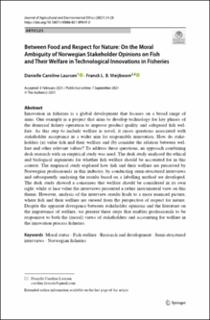| dc.contributor.author | Laursen, Danielle Caroline | |
| dc.contributor.author | Meijboom, Franck L. B. | |
| dc.date.accessioned | 2022-03-23T08:14:18Z | |
| dc.date.available | 2022-03-23T08:14:18Z | |
| dc.date.created | 2021-09-29T15:44:53Z | |
| dc.date.issued | 2021 | |
| dc.identifier.citation | Journal of Agricultural and Environmental Ethics. 2021, 34 . | en_US |
| dc.identifier.issn | 1187-7863 | |
| dc.identifier.uri | https://hdl.handle.net/11250/2986955 | |
| dc.description.abstract | Innovation in fisheries is a global development that focuses on a broad range of aims. One example is a project that aims to develop technology for key phases of the demersal fishery operation to improve product quality and safeguard fish welfare. As this step to include welfare is novel, it raises questions associated with stakeholder acceptance in a wider aim for responsible innovation. How do stakeholders (a) value fish and their welfare and (b) consider the relation between welfare and other relevant values? To address these questions, an approach combining desk research with an empirical study was used. The desk study analysed the ethical and biological arguments for whether fish welfare should be accounted for in this context. The empirical study explored how fish and their welfare are perceived by Norwegian professionals in this industry, by conducting semi-structured interviews and subsequently analysing the results based on a labelling method we developed. The desk study showed a consensus that welfare should be considered in its own right, while at face value the interviews presented a rather instrumental view on this theme. However, analysis of the interview results leads to a more nuanced picture, where fish and their welfare are viewed from the perspective of respect for nature. Despite the apparent divergence between stakeholder opinions and the literature on the importance of welfare, we present three steps that enables professionals to be responsive to both the (moral) views of stakeholders and accounting for welfare in the innovation process fisheries. | en_US |
| dc.language.iso | eng | en_US |
| dc.publisher | Springer Nature | en_US |
| dc.rights | Navngivelse 4.0 Internasjonal | * |
| dc.rights.uri | http://creativecommons.org/licenses/by/4.0/deed.no | * |
| dc.title | Between Food and Respect for Nature: On the Moral Ambiguity of Norwegian Stakeholder Opinions on Fish and Their Welfare in Technological Innovations in Fisheries | en_US |
| dc.type | Peer reviewed | en_US |
| dc.type | Journal article | en_US |
| dc.description.version | publishedVersion | en_US |
| dc.rights.holder | Open Access This article is licensed under a Creative Commons Attribution 4.0 International License, which permits use, sharing, adaptation, distribution and reproduction in any medium or format, as long as you give appropriate credit to the original author(s) and the source, provide a link to the Creative Commons licence, and indicate if changes were made. The images or other third party material in this article are included in the article's Creative Commons licence, unless indicated otherwise in a credit line to the material. If material is not included in the article's Creative Commons licence and your intended use is not permitted by statutory regulation or exceeds the permitted use, you will need to obtain permission directly from the copyright holder. To view a copy of this licence, visit http://creativecommons.org/licenses/by/4.0/. | en_US |
| dc.source.pagenumber | 20 | en_US |
| dc.source.volume | 34 | en_US |
| dc.source.journal | Journal of Agricultural and Environmental Ethics | en_US |
| dc.identifier.doi | 10.1007/s10806-021-09849-0 | |
| dc.identifier.cristin | 1940754 | |
| dc.source.articlenumber | 28 | en_US |
| cristin.ispublished | true | |
| cristin.fulltext | original | |
| cristin.qualitycode | 1 | |

